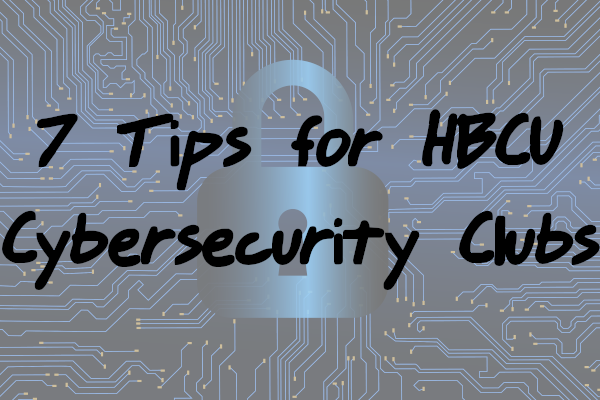What Should an HBCU Cybersecurity Club Do?

Cybersecurity affects every industry, including emerging technologies like artificial intelligence (AI) and quantum computing. Therefore, all Historically Black Colleges and Universities (HBCUs) should have a cybersecurity club. An HBCU cybersecurity club doesn't need to be led by a cybersecurity or STEM student. The leaders need to be passionate about IT security, data privacy, and community development. I believe such student organizations should do some things to start.
Lead the Culture
Students interested in building a community must demonstrate skills in leadership, building a healthy community, interpersonal communication, conflict management, and overall professionalism. Leaders' consistency, or lack thereof, in teamwork, work ethic, communication, and professionalism will have a greater impact on the student organization than any official description on paper.
If you want to learn more about these essential soft skills, complete the free IBM SkillsBuild digital badge course I recommend to IBM HBCU ambassadors: Working in a Digital World: Professional Skills.
Create a Mission Statement
Similar to entrepreneurs with business ventures, the mission statement helps you clearly define the goals - the "why" - behind your student organization. The mission statement sets the foundation for elevator pitches and communicates your plans to your target audience - HBCU students interested in learning more about cybersecurity. For ideation, read this HubSpot post breaking down mission statement examples.
A vision statement describes your long-term goals. It is great to think about future plans, but ensure you focus more on creating a positive experience right now. Send your completed mission statement to a professor in your college for feedback and make adjustments as needed. A helpful marketing quote for perspective:
"People don't buy what you do, but why you do it." - Simon Sinek
Define the Culture - Create a Code of Conduct
A code of conduct outlines expectations for communications, ethical behavior, organizational culture, and the overall social norms and taboos within the cyber club. Legal lesson: The code of conduct is not synonymous with "bylaws" which is a legally binding document setting expectations specific to internal operations and decision-making. Student org leaders must lead by example and enforce the code of conduct. Otherwise, members will take that as a queue to disregard it as well. Remember, any negative action that you commit, or witness but ignore, becomes the new standard and more ingrained.
Here's a list of examples to get you started:
- This is not a Windows, Apple, or proprietary software tech support group. We focus on solutions connected to Linux and free open source software (FOSS).
- Treat everyone with respect, regardless of sex, race, political affiliation, Linux knowledge, or any other classification. That includes not using slurs.
- Ask questions if you need help or are simply curious about other solutions to a problem.
- When a question arises, or you encounter misinformation, say something to be part of the solution, preferably with a source.
- Respect that there are often multiple solutions for a problem. What is best for you may not be best for someone else, especially since someone may not feel comfortable giving full context to their situation.
- Disagreements are normal. Don't resort to personal attacks. Disagreement is no excuse for disrespect or cyber bullying. Don’t say anything here that you wouldn’t do so face-to-face AND wouldn’t want someone saying to you.
- Take responsibility for your actions. Use tact when holding someone accountable.
- This group will be inclusive to students on and off campus. Students and alumni are always welcome.
- In video meetings:
- Use your first name (with a nickname if preferred).
- Turn off audio and video when around noise and distractions.
- Hide personal info from camera view. Disable WebRTC if truly worried about security.
- No deep-fake video camming. If you don’t want to show your face, wear a mask or just keep your video off.
- For better security, do not share shortened or known malicious URLs.
Specify Communication Channels
Part of prioritizing a strong community is deciding on the best applications for the HBCU cybersecurity club to communicate internally and externally. That includes a way to initiate new members, similar to the buyer's journey in marketing (awareness > consideration > decision).
- A private communications channel for club members only. This can be a GroupMe channel, Slack.com workspace, LinkedIn group, or Facebook group.
- A communications channel for increasing awareness among non-members and prospects. This will likely be a social media account but can be an internal website accessible only within your university.
- Meetings that accommodate your college student population. Start your meetings with essential info to quickly bring new members and those interested in joining up to speed (e.g., leaders, goals). This could also be a small handout or video shared beforehand. If your HBCU has online programs, be prepared and willing to set up Zoom or another video conferencing software to include them.
Train Together
There are a couple reasons to supplement HBCU cybersecurity programs with external training:
- University curricula for fast-evolving fields usually are out of date due to admin processes to add updates.
- Some computer-based training award digital badges which may help you stand out against other job applicants.
- Other computer-based training may help students better understand college assignments.
- Learning as a team allows HBCU cybersecurity club members to learn from each others experience and perspective (e.g., how to complete a particular task on Windows versus Linux Kali.
- Collaborative skills are important for professional development.
Prioritize the Community
"Family that prays together, stays together, and one that walks apart, just falls apart" - Juelz Santana, The Second Coming
Try to provide on-campus study spaces for cybersec club members and STEM students to collaborate on IT projects. Once you figure out the logistics for that, graduate to more ambitious networking events:
- Study for cybersecurity certifications - Security+, Certified Information Systems Security Professional (CISSP), etc.
- HBCU cyber ranges such as those facilitated within the IBM HBCU Cybersecurity Initiative.
- Invite recruiters and representatives from various types mentoring and cybersecurity groups - Black Doctoral Network and HBCU CONNECT for example.
- Share job listings and opportunities to gain relevant experience.
- Support your HBCU Linux User Group (LUG), or start one if it doesn't already exist.
- Network with nearby cybersecurity HBCUs and HBCU cybersecurity leadership programs.
Seek Growth Opportunities
Always be open to suggestions that could improve the student organization. Ask if anyone has questions or comments at the end of every meeting. Maybe provide an email address or contact for feedback. Ask other HBCU clubs how they accomplish certain tasks for ideas. That doesn't mean to change rules every month. It does mean that organizational leadership proactively seek ways to gradually improve club culture.
Quick note: You don't need to attend HBCU colleges with cybersecurity majors to create a cybersecurity student organization. If you can find students at your HBCU with cybersecurity interests, you should consider starting a club.
Tags: cybersecurity, hbcus, IT





